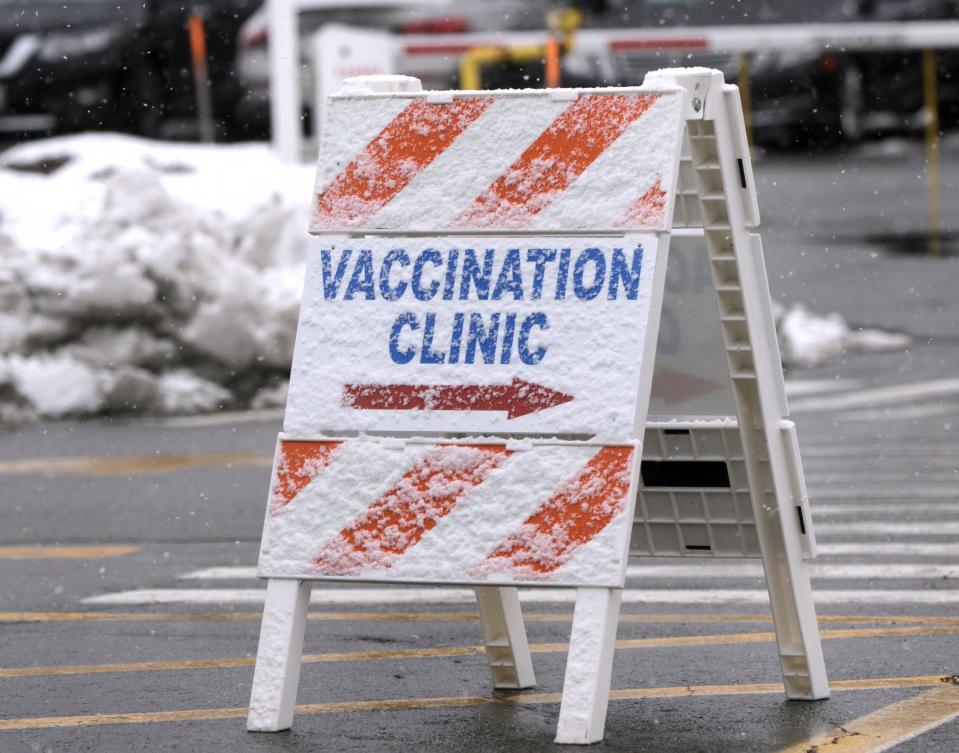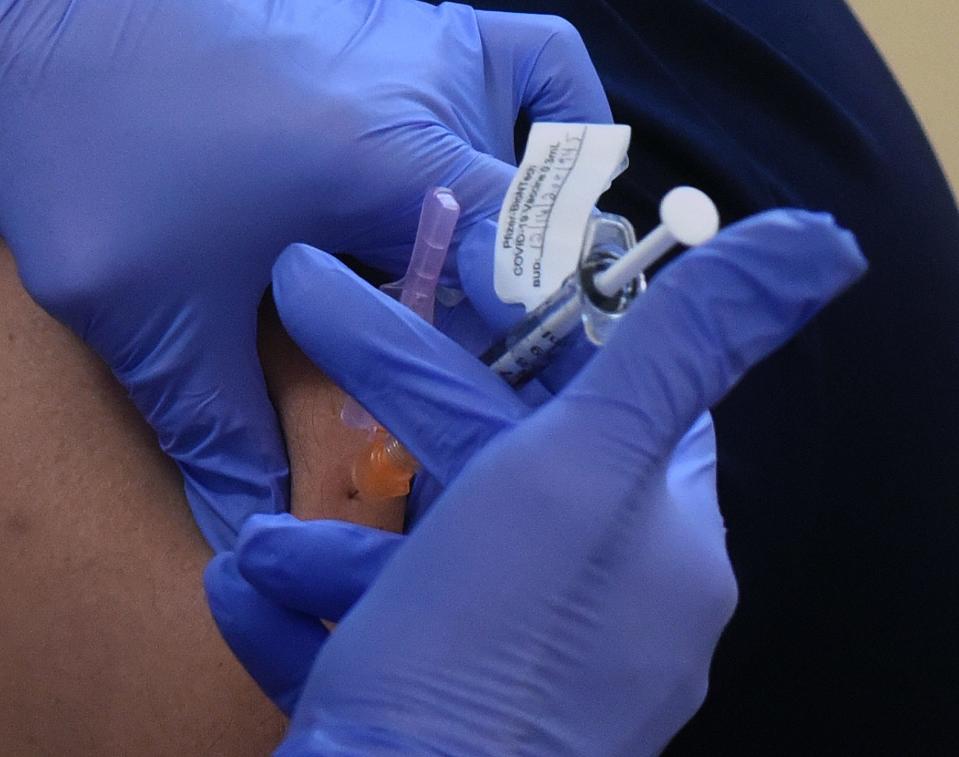Can you cross state lines to get a COVID-19 vaccine? These are the rules in New England
If you reside out of state, but own a ski house in the White Mountains of New Hampshire or a summer home on Maine's Old Orchard Beach, don't try to get the COVID-19 vaccine there.
That's the message from several New England states when it comes to who can receive their limited vaccine supply right now. The answer is: residents only.
But enforcement mechanisms are few, and no states cite any penalties for perceived violators.
What is vaccine tourism?
In what's being referred to as vaccine "tourism" or "hunting," individuals across the country are seeking out the most optimal or fastest ways to receive the coronavirus vaccine – stalking pharmacies and clinics for leftover doses, or crossing state lines for a quicker result.
Florida had to change its vaccination policy in January after more than 57,000 out-of-staters received shots in the Sunshine State. It was there the term "vaccine tourism" was dubbed.
In Arizona, Gov. Doug Ducey has said "snowbirds" are part of the reason why the state needs more vaccine supply.

Some call it cheating the system, others say vaccinating as many people as possible should be the ultimate goal. In New England, there's a lot of room for interpretation.
"I think what some have encountered, particularly in New England, a lot of states are saying because of limited supply, we're really trying to restrict distribution to those we can cite as actually being citizens of the state," said Jim Potter, executive director of the New Hampshire Medical Society. "Of course we want to see as many people get vaccinated as soon as possible, but I think the states are trying to manage these processes to identify those most medically vulnerable."
More: Cutting, bribing, stealing: Some people get COVID-19 vaccines before it's their turn
More: COVID-19 'vaccine tourism': Unwanted travelers lining up for inoculations
New England's unique geographic proximity and its unsystematic patchwork of vaccine plans present the possibility that people may try to get vaccinated in a state where they don't live full-time, or live at all.
While individuals might not be eligible to receive the vaccine under their home state's current phase, they could be eligible across the state border, or perhaps in a state where they own a second home.

Dr. William John Moss, executive director of the International Vaccine Access Center at Johns Hopkins University Bloomberg School of Public Health, told USA TODAY last week that people "should be willing to wait their turn."
"If people have opportunities to cut the line, they should think (twice) about it, if they’re not in a high-risk category," said Moss.
Just this week, Maine's governor had harsh words for the state's largest healthcare system following discovery that it gave the vaccine to out-of-state contractors. She called it an "insult" to those "patiently waiting."
Is COVID-19 vaccine tourism ethical? Is it fair?
For Carlene Pavlos, executive director at the Massachusetts Public Health Association, it's mostly about equity. Communities most impacted by the virus should receive the vaccine first, she said, "a critical public health strategy" that's undermined when individuals seek to "cut the line."
"Folks that have the wherewithal to spend a lot of time online and cross state lines and community lines outside of the planned phases are not those usually impacted by inequity," Pavlos said. "They are people with access who are already plugged in."
"This is an ethical stance, it is also a public health stance," she added. "It is a stance about how we are going to end this deadly pandemic the most quickly."
State officials in New England say they're taking steps to prevent ineligible people from obtaining the vaccine, but weighing that with the overall goal of vaccinating as many people as possible, and doing so equitably. Here are the policies of each state in the region.
What is New Hampshire's vaccine policy?
Just three weeks ago, anyone who owned property in New Hampshire was allowed to get a vaccine in the state, according to the state's website.
That policy was changed, and changed quickly, after a New Hampshire Public Radio story brought attention to it. Jake Leon, spokesman for the state Department of Health and Human Services, said "residents only" was always the case, but rather the state "clarified" the policy.
Now, residents are required to bring one of the following documents when they arrive for their vaccine appointment:
a valid New Hampshire driver's license or nondriver ID card;
a payroll check, payroll document or employment contract showing a legal New Hampshire address, dated within the past 60 days;
or a government-issued payment, such as Social Security, showing a legal New Hampshire address, dated within the past 60 days.
New Hampshire's documentation requirement now appears to be the strictest in New England.
COVID Vaccine: NH to partner with Walgreens for COVID vaccines, plus state sites will expand hours
"We are confident that the documentation necessary to get the vaccine in New Hampshire will stop people from other states from being able to schedule an appointment, however, we are monitoring registrations to ensure that only residents are registering," said Leon.
The Granite State is currently vaccinating residents 65 and older.
What is Maine's vaccine policy?
In the state with the most vacation homes in the country, only residents are allowed to receive the vaccine at this time, officials citing “an extremely limited supply."
Enforcement is left to the individual clinics. Robert Long, spokesperson for the Maine Center for Disease Control and Prevention, said vaccination clinics are asked to ensure "that they have systems in place to comply with this policy."
'We expected the variant to arrive': Maine confirms first UK variant COVID case
Last week, Gov. Janet Mills castigated MaineHealth for administering the vaccine to out-of-state contractors.
Calling it an "inexcusable act," Mills said the decision was an insult "to those who are waiting patiently for their turn – the 80-year-old grandmother who hasn’t seen her family in months, the man being treated for cancer, the teacher wanting to return to the classroom, the grocery clerks and delivery drivers who are exposed to the public and working to put food on the table."
Maine is currently vaccinating residents 70 and older.
What is Vermont's vaccine policy?
In Vermont, the vaccine is reserved for residents and those who work in the state or see a primary healthcare provider there, but there's no enforcement mechanism, as the state doesn't require identification before vaccination.
"We know that things like requiring identification can be a big barrier when it comes to accessing things like vaccines and other health services," said Ben Truman, spokesman for the Vermont Department of Health. "We know there may be some risk of people getting a vaccine in Vermont even when they aren't eligible – we are trusting but not naïve. But that minor risk is worth taking to ensure more equitable access for people in Vermont."
Truman said registration systems do request information, such as an address, that the department believes "will limit opportunities for false information."
Public Health: 'Twindemic' feared but flu slowed by precautions taken to slow COVID
"We believe the number of people who might register when they are not eligible is small," he said. "We are focused on getting as many eligible people vaccinated as possible, and have taken steps to prevent ineligible people from getting a vaccine. We see things like vaccine shopping as a minor risk that any state may face in this effort, but we are not letting it get in the way of our main goal of getting as much vaccine to eligible Vermonters as possible."
Vermont is currently vaccinating individuals 75 and older.
What is the Massachusetts vaccine policy?
The Massachusetts Department of Public Health says doses are "intended" for "individuals who live, work or study in the Commonwealth."
Identification is not required to receive the vaccine, the state says, but if an individual presents a signed "online attestation form," then they've "sufficiently demonstrated their eligibility," the state tells providers.
"You may ask an individual for identification, however, it is not necessary for purposes of identifying their eligibility within a given phase or priority group," the state wrote to providers in a letter last month. "Providers should use their best judgment when requesting an ID, keeping in mind some individuals may not have an identification card. Providers are encouraged to be sensitive to populations that are unlikely to have an identification card and should not implement barriers to obtaining the vaccine."

Massachusetts is currently vaccinating individuals 75 and older, as well as younger companions who accompany them, following guidelines.
What is Rhode Island's vaccine policy?
On its website, Rhode Island doesn't specify if the vaccine is limited to residents, but rather answers, "You will need to receive both doses in the same state," to a question about being a summer resident.
But further information provided by Joseph Wendelken, spokesperson for the state Health Department, clarified that Rhode Island's vaccine supply is for residents only when it comes to age-based vaccinating. Identification is required, he said.
Wendelken said Rhode Island has "not encountered any issues with this yet." The state is hoping to soon begin vaccinating those 75 and older.

What is Connecticut's vaccine policy?
In Connecticut, you are eligible to receive the vaccine if you either live or work in the state.
However, a state-issued ID is not required to get a vaccination, and not a prerequisite for eligibility. "No person will be turned away based on their ability to show ID," according to the state.
Maura Fitzgerald, head of COVID-19 communications for the state Department of Public Health, said the department is aware of some vaccination providers/sites that have been less strict than others in enforcing the "vaccination program's priorities and directives," including the residency/work requirement.
"The governor and DPH are serious about making sure the priorities are followed," Fitzgerald said. "We've had conversations with those providers to reiterate what the rules and the priorities are. We are also looking at a range of possible enforcement strategies for how to address these issues when they arise."
Fitzgerald noted the DPH is balancing Gov. Ned Lamont's charge to "not be too restrictive in implementing the rules," with instituting measures that will protect the integrity of the vaccine program.
Connecticut is currently vaccinating individuals 75 and older.
This article originally appeared on USA TODAY NETWORK: 'Vaccine tourism': Who's eligible in Mass., RI, VT, NH, Maine, Conn.?

